ON DEMAND
1.0 Ethics, 1.0 Substantive
Artificial Intelligence: The New Ethical Frontier
Artificial Intelligence: The New Ethical Frontier
Considered one of the most provocative ethical issues facing the 21st century, this seminar examines cutting edge advances in AI (Artificial Intelligence), its legal and moral issues and what the Talmud says about AI, the nature of the mind and freewill.
- Can Machines Learn to be Moral?
- Who's Responsible When a Self-Driving Car or a Robotic Surgeon Make a Mistake?
- Should Courts Use AI to Sentence Criminals?
- Should Machines be Allowed to Take Over Human Jobs?
- What is the Torah’s View on Artificial Intelligence, the Mind and Freewill?
Presenters:
Mitchell P. Marcus
RCA Professor of Artificial Intelligence, University of Pennsylvania
Mitchell Marcus is the RCA Professor of Artificial Intelligence in the Department of Computer and Information Science (CIS) at the University of Pennsylvania, where he is also Professor of Linguistics. He studied Linguistics and Applied Mathematics at Harvard University as an undergraduate, received his Ph.D. in 1978 from the MIT Artificial Intelligence Lab, and was a Member of Technical Staff at AT&T Bell Laboratories. He has served as Chair of the CIS Department at Penn, as Chair of the Penn Faculty Senate, as well as President of the Association for Computational Linguistics (ACL). He is a Fellow of the American Association of Artificial Intelligence and a Founding Fellow of the ACL. His research interests include: statistical natural language processing, cognitively plausible models for automatic acquisition of linguistic structure, and human-robot communication. He is also a member of the Scientific Advisory Board of H5 Technologies, a San Francisco-based eDiscovery company..
Matthew U. Scherer, Esq.
Robotics and Artificial Intelligence Attorney, Littler and Mendelson, P.C.
Matt Scherer is an attorney and legal scholar based in Portland, Oregon who writes and speaks on the intersection of law and artificial intelligence. He is an associate with the international labor and employment law firm Littler Mendelson P.C., where he is a member of the Robotics, Artificial Intelligence, and Automation practice group. He is a magna cum laude graduate of the Georgetown University Law Center and the author of Regulating Artificial Intelligence Systems: Risks, Challenges, Competencies, and Strategies. He previously served for more than two years as an assistant prosecuting attorney in Pontiac, Michigan. He has also completed three judicial clerkships, covering both state and federal courts and courts at the trial court, intermediate appellate court, and supreme court levels.
Rabbi Mordechai Becher
Adjunct Professor of Jewish Philosophy and History, James Striar School, Yeshiva University
Rabbi Mordechai Becher, originally from Australia, is an instructor at Yeshiva University and alumni Rabbi of Neve Yerushalayim College. He received his ordination from the Chief Rabbinate of Israel and the Chief Rabbi of Jerusalem and holds an MA in Medieval Jewish History from the Bernard Revel Graduate School. He taught at Ohr Somayach and Neve Yerushalayim in Jerusalem and served in the Israel Defense Forces. Rabbi Becher has answered thousands of questions on AsktheRabbi.org, presents a Talmud class, Dimensions of the Daf, for the Jewish Broadcasting Service and was senior lecturer for Gateways for 20 years. Rabbi Becher’s latest book, Gateway to Judaism, published by Artscroll, is in its tenth printing. He has taught in the USA, Canada, England, Israel, South Africa, Australia and Russia, and is a scholar in residence for Legacy Kosher Tours. He has led tours in Africa, Australia, Czech Republic, China, Egypt, England, Hungary, India, Italy, Israel, Japan, Morocco, Panama, Russia, South Korea, Tanzania, Thailand and Vietnam.
CLE CREDIT: 1.0 Substantive, 1.0 Ethics
Couldn't load pickup availability


